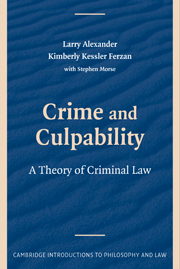4 - Defeaters of Culpability
Published online by Cambridge University Press: 05 June 2012
Summary
As we have established, primarily in Chapter 2 and by exclusion of inadvertent negligence in Chapter 3, an actor's culpability is the product of the risk(s) to others' protected interest(s) that he believes he has unleashed by a temporally fixed act of his will and the reason(s) he had for so willing. We believe that the criminal law should intervene at the point at which the imbalance of risks and reasons represents a gross deviation from the standard of care that a law-abiding citizen would observe in the actor's situation.
This formulation – encompassing both a comparison of risks to reasons and a comparison of the actor to the law-abiding person – contains within it much of the current doctrines of justification and excuse. That is, whenever the actor's reasons are sufficient to justify the risk, the actor is justified. Even if the actor's actions were not justified, if she has lived up to all that we can fairly expect of her, then she is excused. Despite the fact that much of what currently constitute defenses are subsumed within our culpability calculation in Chapter 2, we offer our thoughts here on those special reasons that justify risks often thought to be “justifications,” and we offer our view on how excusing conditions should be construed.
We begin with agent-neutral justifications. First, we discuss the lesser-evils defense, the paradigmatic consequentialist justification. We also explore deontological side constraints on the consequentialist calculus.
- Type
- Chapter
- Information
- Crime and CulpabilityA Theory of Criminal Law, pp. 86 - 168Publisher: Cambridge University PressPrint publication year: 2009

